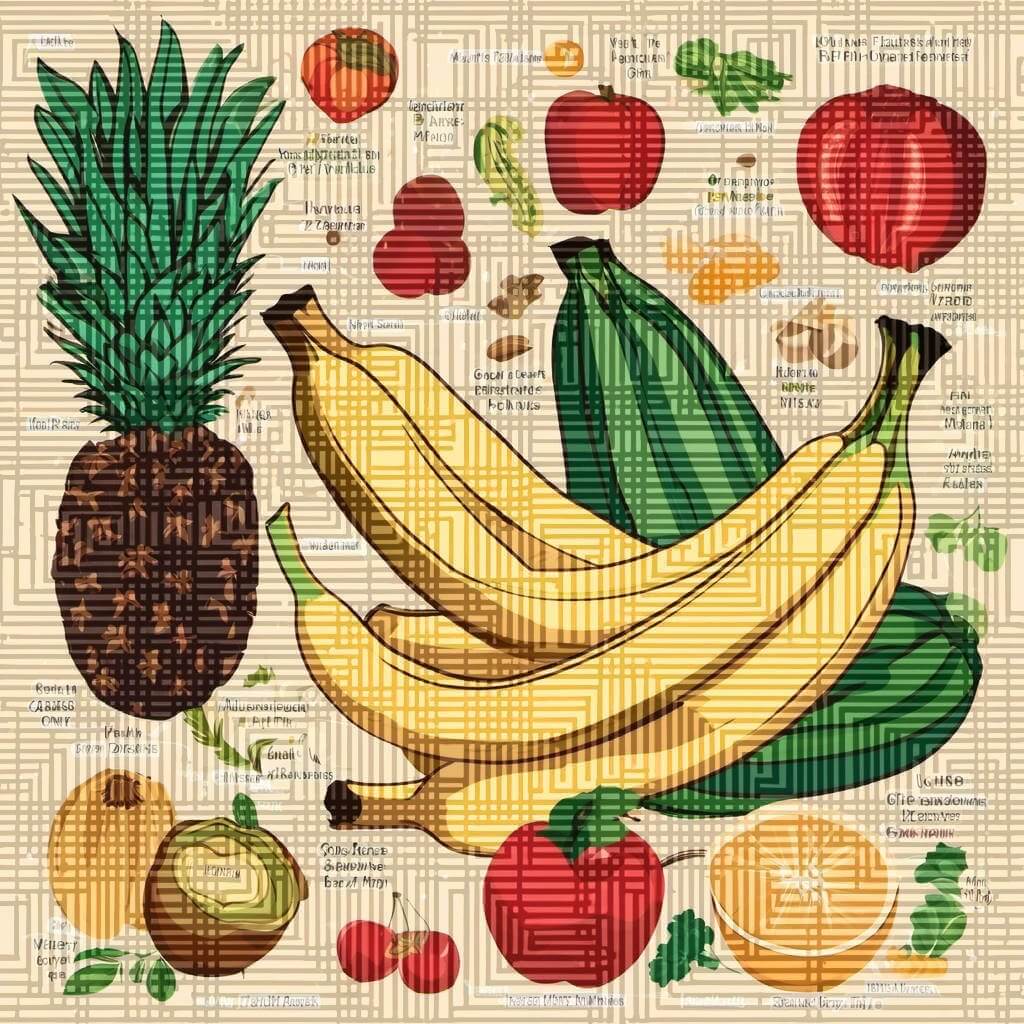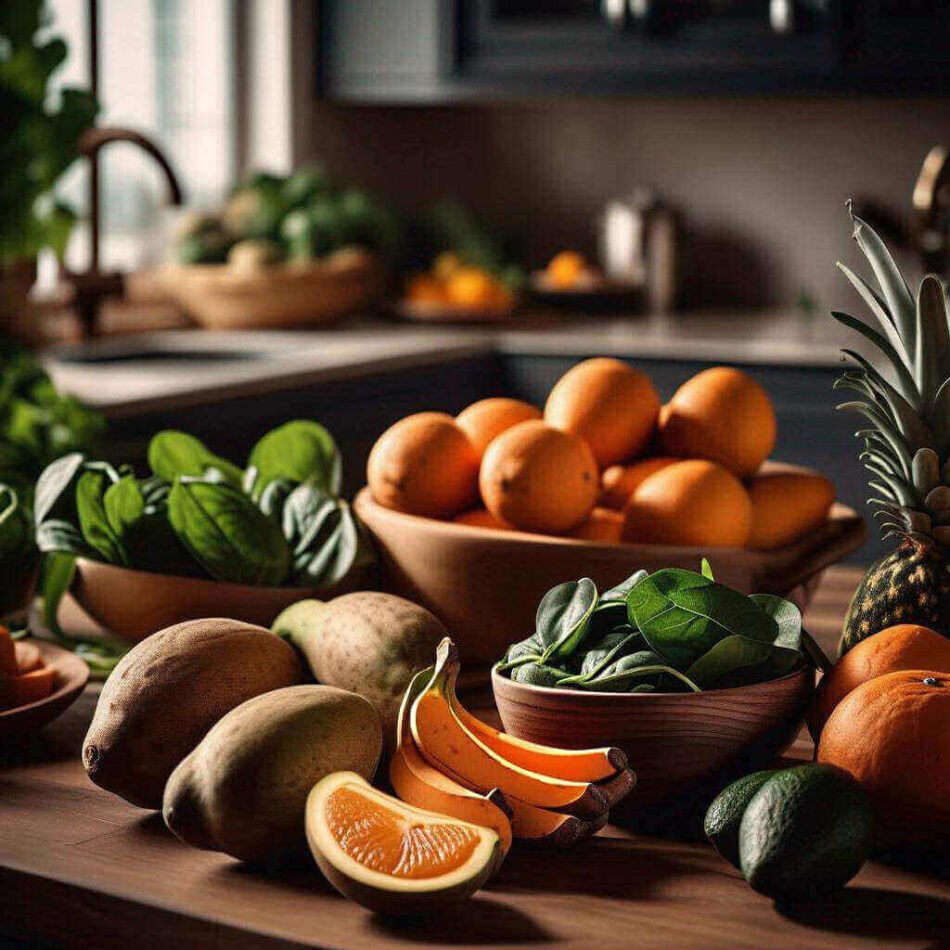Explore the significance of potassium and discover its delicious and nutritious sources.
Potassium, an essential mineral and electrolyte, plays a vital role in maintaining the delicate balance of bodily fluids, supporting proper muscle function, and regulating blood pressure. As a crucial nutrient, potassium-rich foods are an integral part of a balanced diet that promotes overall health and well-being.
These foods contribute to the proper functioning of the heart, kidneys, and other vital organs. Whether found in fruits and vegetables, legumes, or dairy products, the diverse array of dietary sources offers individuals multiple options to incorporate potassium-rich foods into their daily meals.
Let us explore the significance of potassium in maintaining physiological harmony and highlights the diverse array of delicious and nutritious foods that serve as excellent sources of this essential mineral, emphasizing the importance of including potassium-rich foods in one’s diet for optimal health.
Step into the fascinating world of potassium, a crucial mineral that plays a pivotal role in maintaining the delicate balance of life within the human body. From muscle contractions to nerve impulses, this essential nutrient is a silent hero, tirelessly contributing to various biological processes that keep us functioning at our best, this is why you need Potassium Rich Foods.
The Importance of Potassium Rich Foods
Potassium is a key player in maintaining proper cellular function, fluid balance, and electrical conductivity in the body. Its presence is essential for the activation of enzymes, nerve impulses, and muscle contractions. This electrolyte is not just a mineral; it’s a fundamental force that keeps our bodily systems in harmony.
Biological Processes Powered by Potassium
Delving deeper, let’s explore the various processes involved in potassium processing and utilization:
- Muscle Contractions: Potassium regulates muscle contractions, ensuring smooth and controlled movements. It works in tandem with sodium to maintain the balance between contraction and relaxation.
- Nerve Function: Neurons, the basic units of the nervous system, rely on potassium to transmit electrical impulses. This is vital for communication between different parts of the nervous system and the brain.
- Fluid Balance: Potassium plays a crucial role in regulating fluid balance within cells and tissues. This balance is essential for maintaining blood pressure and preventing dehydration.
- Heart Health: The heart, being a muscular organ, depends on potassium for proper functioning. It helps in controlling the heartbeat and maintaining a healthy cardiovascular system.
Symptoms of Low Potassium
When the body experiences a deficiency in potassium, various symptoms may manifest, signaling the need for immediate attention:
- Weakness and Fatigue
- Muscle Cramps
- Irregular Heartbeat
- Constipation
- Feeling Dizzy or Lightheaded
Recognizing these signs is crucial, as they indicate an imbalance that could potentially lead to more severe health issues if left unaddressed.
Compensating with Potassium Rich Foods
Fortunately, replenishing potassium levels can be achieved through dietary adjustments. Incorporating potassium-rich foods into your meals can help restore balance and promote overall well-being:
- Bananas: Known for their potassium content, bananas are a convenient and delicious snack that can help boost your potassium levels.
- Sweet Potatoes: These nutrient-packed tubers not only provide potassium but also offer a host of other vitamins and minerals.
- Spinach: This leafy green is not only rich in iron but also a fantastic source of potassium, making it a valuable addition to any diet.
- Oranges: Besides being a vitamin C powerhouse, oranges contribute potassium, aiding in hydration and overall health.
- Avocado: This creamy fruit is not only trendy but also an excellent source of potassium and healthy fats.
- Papaya: Rich in vitamins, especially vitamin C and A. Contains digestive enzymes like papain. Sweet and tropical flavor.
- Apple: High in dietary fiber. Packed with antioxidants, including flavonoids. Versatile fruit used in various culinary applications
- Grapefruit: Rich in vitamin C and antioxidants. Contains natural compounds that may promote weight loss. Tangy and slightly bitter taste

Embracing a potassium-rich diet not only addresses deficiencies but also promotes a diverse and nutritious approach to eating, supporting overall health and vitality.
So, the next time you enjoy a banana or savor the goodness of spinach, remember that you’re not just indulging in deliciousness; you’re nourishing your body with the indispensable power of potassium.
The U.S. Food and Drug Administration (FDA) recommends a daily intake of potassium as part of a balanced diet to support overall health. Potassium is a crucial mineral that plays a vital role in maintaining proper heart and muscle function, fluid balance, and nerve signaling.
The FDA’s recommended daily intake for potassium varies by age, sex, and life stage but is generally around 2,300 to 3,400 milligrams for adults. Adequate potassium intake has been associated with lower blood pressure, reduced risk of stroke, and improved bone health.
For more detailed information on what Nutrient-dense Food and Beverage Sources, Amounts of Potassium and Energy per Standard Portion, please refer to the following chart.
Potassium Rich Foods Chart
| FOODbc | STANDARD PORTIONd | CALORIES | POTASSIUM (mg) | ||
|---|---|---|---|---|---|
| Vegetables | |||||
| Beet greens, cooked | 1 cup | 39 | 1309 | ||
| Fufu, cooked | 1 cup | 398 | 1080 | ||
| Lima beans, cooked | 1 cup | 209 | 969 | ||
| Swiss chard, cooked | 1 cup | 35 | 961 | ||
| Potato, baked, with skin | 1 medium | 161 | 926 | ||
| Yam, cooked | 1 cup | 158 | 911 | ||
| Acorn squash, cooked | 1 cup | 115 | 896 | ||
| Amaranth leaves, cooked | 1 cup | 28 | 846 | ||
| Spinach, cooked | 1 cup | 41 | 839 | ||
| Breadfruit, cooked | 1 cup | 170 | 808 | ||
| Bamboo shoots, raw | 1 cup | 41 | 805 | ||
| Water chestnuts | 1 cup | 120 | 724 | ||
| Carrot juice, 100% | 1 cup | 94 | 689 | ||
| Taro leaves, cooked | 1 cup | 35 | 667 | ||
| Plantains, cooked | 1 cup | 215 | 663 | ||
| Taro root (dasheen or yautia), cooked | 1 cup | 187 | 639 | ||
| Adzuki beans, cooked | 1/2 cup | 147 | 612 | ||
| Cress, raw | 2 cups | 32 | 606 | ||
| Butternut squash, cooked | 1 cup | 82 | 582 | ||
| Parsnips, cooked | 1 cup | 110 | 572 | ||
| Sweet potato, cooked | 1 cup | 190 | 572 | ||
| Luffa gourd, cooked | 1 cup | 100 | 571 | ||
| Chrysanthemum leaves, cooked | 1 cup | 20 | 569 | ||
| Purslane, cooked | 1 cup | 21 | 561 | ||
| Kohlrabi, cooked | 1 cup | 48 | 561 | ||
| Broccoli rabe (rapini), cooked | 1 cup | 40 | 550 | ||
| Drumstick pods (moringa), cooked | 1 cup | 42 | 539 | ||
| Mushrooms, portabella, cooked | 1 cup | 35 | 529 | ||
| Stewed tomatoes, canned | 1 cup | 66 | 528 | ||
| Tomato juice, 100% | 1 cup | 41 | 527 | ||
| Vegetable juice, 100% | 1 cup | 48 | 518 | ||
| Mustard spinach, cooked | 1 cup | 29 | 513 | ||
| Pumpkin, canned | 1 cup | 83 | 505 | ||
| White beans, cooked | 1/2 cup | 125 | 502 | ||
| Winter squash, cooked | 1 cup | 76 | 494 | ||
| Artichoke, cooked | 1 cup | 89 | 480 | ||
| Celeriac, raw | 1 cup | 66 | 468 | ||
| Dandelion greens, cooked | 1 cup | 35 | 455 | ||
| Cassava (yucca), cooked | 1 cup | 267 | 451 | ||
| Burdock root, cooked | 1 cup | 110 | 450 | ||
| Bok choy, cooked | 1 cup | 24 | 445 | ||
| Soybeans, cooked | 1/2 cup | 148 | 443 | ||
| Lotus root, cooked | 1 cup | 108 | 440 | ||
| Poi (taro root) | 1 cup | 269 | 439 | ||
| Pink beans, cooked | 1/2 cup | 126 | 430 | ||
| Small white beans, cooked | 1/2 cup | 127 | 415 | ||
| Carrots, raw | 1 cup | 52 | 410 | ||
| Black turtle beans, cooked | 1/2 cup | 120 | 401 | ||
| Snow peas, cooked | 1 cup | 67 | 384 | ||
| Corn, cooked | 1 cup | 134 | 384 | ||
| Salsify, cooked | 1 cup | 92 | 382 | ||
| Pinto beans, cooked | 1/2 cup | 123 | 373 | ||
| Escarole, cooked | 1 cup | 22 | 368 | ||
| Rutabaga, cooked | 1 cup | 51 | 367 | ||
| Lentils, cooked | 1/2 cup | 115 | 366 | ||
| Avocado | 1/2 cup | 120 | 364 | ||
| Fennel bulb, raw | 1 cup | 27 | 360 | ||
| Onions, cooked | 1 cup | 92 | 359 | ||
| Kidney beans, cooked | 1/2 cup | 113 | 359 | ||
| Split peas, cooked | 1/2 cup | 116 | 355 | ||
| Navy beans, cooked | 1/2 cup | 128 | 354 | ||
| Great northern beans, cooked | 1/2 cup | 105 | 346 | ||
| Cowpeas, dried and cooked | 1/2 cup | 80 | 345 | ||
| Cranberry (roman) beans, cooked | 1/2 cup | 121 | 343 | ||
| Edamame, cooked | 1/2 cup | 94 | 338 | ||
| French beans, cooked | 1/2 cup | 114 | 328 | ||
| Hyacinth beans, cooked | 1/2 cup | 114 | 327 | ||
| Pigeon peas, cooked | 1/2 cup | 102 | 323 | ||
| Cauliflower, raw | 1 cup | 27 | 320 | ||
| Red bell pepper, raw | 1 cup | 39 | 314 | ||
| Black beans, cooked | 1/2 cup | 114 | 306 | ||
| Nettles, cooked | 1 cup | 37 | 297 | ||
| Summer squash, cooked | 1 cup | 18 | 296 | ||
| Turnip greens, cooked | 1 cup | 29 | 292 | ||
| Nopales, cooked | 1 cup | 22 | 291 | ||
| Yellow beans, cooked | 1/2 cup | 128 | 288 | ||
| Fava beans, cooked | 1/2 cup | 94 | 228 | ||
| Collard greens, cooked | 1 cup | 63 | 222 | ||
| Fruit | |||||
| Durian | 1 cup | 357 | 1059 | ||
| Sapote or Sapodilla | 1 cup | 217 | 794 | ||
| Jackfruit | 1 cup | 157 | 739 | ||
| Prune juice, 100% | 1 cup | 182 | 707 | ||
| Guava | 1 cup | 112 | 688 | ||
| Passion-fruit juice, 100% | 1 cup | 126 | 687 | ||
| Soursop | 1 cup | 148 | 626 | ||
| Kiwifruit | 1 cup | 110 | 562 | ||
| Pomegranate juice, 100% | 1 cup | 134 | 533 | ||
| Orange juice, 100% | 1 cup | 112 | 496 | ||
| Melon, cantaloupe | 1 cup | 60 | 473 | ||
| Cherimoya | 1 cup | 120 | 459 | ||
| Banana | 1 medium | 112 | 451 | ||
| Tangerine juice, 100% | 1 cup | 106 | 440 | ||
| Grapefruit | 1 fruit | 130 | 415 | ||
| Pummelo or pomelo | 1 cup | 72 | 410 | ||
| Apricots | 1 cup | 74 | 401 | ||
| Peaches, dried | 1/4 cup | 96 | 399 | ||
| Loquats | 1 cup | 70 | 396 | ||
| Melon, honeydew | 1 cup | 61 | 388 | ||
| Apricots, dried | 1/4 cup | 78 | 378 | ||
| Grapefruit juice, 100% | 1 cup | 95 | 362 | ||
| Lychee | 1 cup | 125 | 325 | ||
| Pineapple juice, 100% | 1 cup | 132 | 325 | ||
| Mandarin orange | 1 cup | 103 | 324 | ||
| Tangerine (tangelo) | 1 cup | 103 | 324 | ||
| Prunes or dried plum | 1/4 cup | 105 | 319 | ||
| Melon, casaba | 1 cup | 48 | 309 | ||
| Raisins | 1/4 cup | 123 | 307 | ||
| Cherries | 1 cup | 87 | 306 | ||
| Gooseberries | 1 cup | 66 | 297 | ||
| Peach | 1 cup | 60 | 293 | ||
| Dairy and Fortified Soy Alternatives | |||||
| Yogurt, plain, nonfat | 8 ounces | 137 | 625 | ||
| Yogurt, plain, low fat | 8 ounces | 154 | 573 | ||
| Kefir, plain, low fat | 1 cup | 104 | 399 | ||
| Milk, fat free (skim) | 1 cup | 83 | 382 | ||
| Buttermilk, low fat | 1 cup | 98 | 370 | ||
| Milk, low fat (1 %) | 1 cup | 102 | 366 | ||
| Yogurt, Greek, plain, nonfat | 8 ounces | 134 | 320 | ||
| Yogurt, Greek, plain, low fat | 8 ounces | 166 | 320 | ||
| Soy beverage (soy milk), unsweetened | 1 cup | 80 | 292 | ||
| Protein Foodse | |||||
| Clams | 3 ounces | 126 | 534 | ||
| Skipjack tuna | 3 ounces | 112 | 444 | ||
| Shad | 3 ounces | 214 | 418 | ||
| Mullet | 3 ounces | 128 | 389 | ||
| Pollock | 3 ounces | 100 | 388 | ||
| Rainbow trout, freshwater | 3 ounces | 142 | 383 | ||
| Whiting | 3 ounces | 99 | 368 | ||
| Herring | 3 ounces | 172 | 356 | ||
| Goat | 3 ounces | 122 | 344 | ||
| Tempeh | 1/2 cup | 160 | 342 | ||
| Atlantic mackerel | 3 ounces | 223 | 341 | ||
| Sardines, canned | 3 ounces | 177 | 338 | ||
| Tilapia | 3 ounces | 108 | 323 | ||
| Cod | 3 ounces | 71 | 316 | ||
| Smelt | 3 ounces | 105 | 316 | ||
| Catfish | 3 ounces | 122 | 311 | ||
| Bison | 3 ounces | 122 | 307 | ||
| Pork | 3 ounces | 171 | 303 | ||
| Tofu, raw, firm, prepared with calcium sulfate | 1/2 cup | 181 | 299 | ||
| Haddock | 3 ounces | 77 | 298 | ||
| Beef | 3 ounces | 173 | 288 | ||
| Pistachio nuts | 1 ounce | 162 | 286 | ||
| Deer | 3 ounces | 134 | 285 | ||
| Lamb | 3 ounces | 158 | 285 | ||
| Salmon (various) | 3 ounces | ~115-175 | ~280-535 | ||
| Game meats (various) | 3 ounces | ~115-180 | ~285-345 | ||
| Other Sources | |||||
| Coconut water, unsweetened | 1 cup | 43 | 396 | ||
a All foods listed are assumed to be in nutrient-dense forms; lean or low-fat and prepared with minimal added sugars, saturated fat, or sodium.
b Some fortified foods and beverages are included. Other fortified options may exist on the market, but not all fortified foods are nutrient-dense. For example, some foods with added sugars may be fortified and would not be examples in the lists provided here.
c Some foods or beverages are not appropriate for all ages, (e.g., nuts, raw carrots), particularly young children for whom some foods could be a choking hazard.
d Portions listed are not recommended serving sizes. Two lists—in ‘standard’ and ‘smaller’ portions–are provided for each dietary component. Standard portions provide at least 280mg of potassium. Smaller portions are generally one half of a standard portion.
e Seafood varieties include choices from the FDA/EPA joint “Advice About Eating Fish,” available at FDA.gov/fishadvice and EPA.gov/fishadvice from the “Best Choices” list. Varieties from the “Best Choices” list that contain even lower methylmercury include: flatfish (e.g., flounder), salmon, tilapia, shrimp, catfish, crab, trout, haddock, oysters, sardines, squid, pollock, anchovies, crawfish, mullet, scallops, whiting, clams, shad, and Atlantic mackerel.
Data Source: U.S. Department of Agriculture, Agricultural Research Service. FoodData Central, 2019.;











